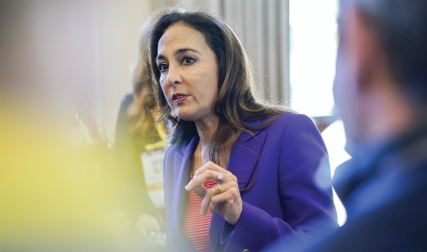The Governor
I appreciated the article by Richard Babcock ’69 on Bruce Rauner ’78 [“Capital Business,” May/June]. While I have spent little time in Illinois, I’ve followed its financial situation for years with considerable disgust. As a concerned citizen, I followed Rauner’s travails as governor in the national mainstream media with great interest. It always appeared to me that he was sincerely trying to do the best for Illinois citizens through time—promoting activities to improve their quality of life while living within their means. The country needs more even-handed, balanced politicians such as Rauner, and I hope he decides to run again for public office.
BILL WOOD ’61
Menlo Park, California
Bruce Rauner proved himself utterly incapable of governing Illinois. His “my way or the highway” style was disastrous for a deep blue state where compromise was vital. His best decision? Moving to Florida.
MARTY HANSEN ’75
Chicago
I read with interest about Bruce Rauner’s attempts to reform Illinois government. This seems admirable. However, his story raises questions about our economic and political systems. On economics, since when is the most important objective of business to maximize shareholder value by providing great value to customers, filling their every need or want? Those two outcomes require the highest price possible with the lowest cost for production of goods and services. Since labor is a significant cost of production, where does that leave workers?
Second, how does one earn, not make but earn, $500 million or more in about 35 years? That wealth comes from the labor of workers. In the 1950s the average CEO made 20 to 30 times what a floor worker earned. Now that ratio is 300 to 1. Did CEOs get 10 times better in just more than half a century? In that same time workers’ earnings have stayed relatively flat when inflation is accounted for.
Politically, why does a candidate for governor need to put in $150 million of his own money to run? Who of the bottom 99.5 percent could do that? Regarding government as compared with business, Rauner says, “The goal is not satisfying a customer need, it’s improving the quality of life for people.” Why is quality of life not a priority for business? What about the regulations and taxes he is concerned about? Yes, some regulations are poorly written by imperfect people, but almost all are created with good intent in response to problems generally created by business. Most large businesses and the wealthy pay a smaller percentage of their taxes than the majority of middle-class citizens. Is that how it should be?
DON RIES ’66
Tucson, Arizona
Closing Time
I was sad to read of the closing of the Kresge Physical Sciences Library [“Libraries to Close,” May/June]. That was the library I used to use as a physics major. Truth to tell, though, I used the lounge outside more often than the library. It was a good napping place and a good place to meet with other physical sciences majors. I hope they’ll keep the lounge, even if they close the library.
ANNE BARSCHALL ’78
Tarrytown, New York
Where There’s FIRE
I read with interest the letters regarding the free speech survey conducted by, among others, the Foundation for Individual Rights in Education [“Your Turn,” May/June]. To those readers intrigued, puzzled, or disturbed by the writers’ characterization of the survey’s results, I would commend that they do what they likely were taught to do at Dartmouth: Read the source documents and supporting data, consider its sponsors and funding sources, and read other social scientists’ assessments of the survey’s methodology.
I neither endorse nor challenge the survey’s results, such as they are. But I would caution any interested alumni not to accept, without a bit more analysis, any media outlet’s (or anyone else’s) description of what this survey does—or does not—tell us about free speech on college campuses.
JOHN F. BRENNER ’78
Fair Haven, New Jersey
Where There’s Smoke
I was delighted to learn of the College’s tobacco-free campus policy [“Smoke Out,” March/April], but disappointed to see the criticism leveled at it [“Your Turn,” May/ June]. Unfortunately, many people are still not aware of the detrimental effects of tobacco smoke on nonsmokers—both indoors and outdoors. It was Dartmouth’s own C. Everett Koop ’37 who wrote the landmark 1986 U.S. surgeon general’s report establishing the link between secondhand tobacco smoke and lung cancer. Since then, many studies have demonstrated various health hazards from such smoke. President Hanlon is to be commended for having Dartmouth join hundreds of other colleges that have instituted tobacco-free policies in order to protect the health of their communities.
PETE HANAUER ’61
Berkeley, California
Heartbeat Away
“Pow Wow: Heartbeat of the People” [May/June] contained a glaring inaccuracy about when the Pow Wow was moved to the Green. The Pow Wow officially moved to the Green in 1995. The story of how the Pow Wow got to the Green also was omitted. For those of us on campus at the time, reading that the Pow Wow is one of only six events allowed on the Green without telling the history of how that happened feels like an erasure of a reckoning the College went through.
When I matriculated in the fall of 1992, the atmosphere for Native Americans at Dartmouth (NAD) students was, at times, pretty hostile. The Hovey murals were still on the walls in the Hovey Pub, The Dartmouth Review handed out “Dartmouth Indians” T-shirts during freshman orientation, and students at football games regularly shouted the old “Wah hoo wah” chant.
The annual Dartmouth Pow Wow was completely run by NAD. My freshmen year it was such a thrill to have NAD families from across the country come to campus for it. The Pow Wow was the relief valve where we were authentically ourselves and invited the entire College to join us.
It was apparent, though, that as a one-day event at the Bema, it was not living up to its full potential. Many Dartmouth students didn’t even know it existed.
After the 1994 Pow Wow we began to imagine how we could make the event bigger and more impactful. That fall and winter NAD began to explore the possibility of moving the event to the Green and extending it to two days. Although we expected the College would not provide extra funding for a bigger Pow Wow, we did not expect the administration, mainly buildings and grounds (B&G), to balk so strongly at the prospect of holding the Pow Wow on the Green, contending that the event would kill the grass and damage the Green. None of us accepted that. The Homecoming bonfire, Green Key Weekend, etc., were large events attracting huge crowds to the Green and none of them destroyed the grass. One student brought her moccasins to one of the meetings with administrators and handed them around so they could feel the bottoms.
Around the same time President Bill Clinton was secured as the 1995 Commencement speaker—an amazingly huge deal—and the College decided to move that event from the Baker lawn to the Green. B&G dug in its heels even harder and began to rope off sections of the Green to have the grass looking spectacular for the president’s visit.
The next argument we faced was that Pow Wow could not be held on the Green because the charter with the Town of Hanover that governed the use of the Green did not mention the event specifically—even though many other non-chartered events were held there. Thankfully, James Wright, acting president at the time, was sympathetic to our cause and pledged to support getting the Pow Wow moved.
NAD leveraged Wright’s support and got the charter changed. NAD and the Native American program came together to bring the Pow Wow to the center of campus and change the College forever.
CHRIS NEWELL ’96
Bar Harbor, Maine
Future Shock
I always enjoy the magazine, but the May/June issue served up an especially entertainingly frothy mix of letters from alums 16 to 31 years than older I am, upset about a range of items from smoking restrictions to library weathervanes and Koch Brothers-funded freedom of speech surveys. I look forward to some free time once my kids are out of college (June 2027, God willing) and seeing what Dartmouth items pique my ire.
CHRIS BAKER ’87
San Francisco
Unforced Error
Last year I retired after 28 years of coaching cross country and track and field at Dartmouth. Like many alumni, I was extremely pleased to see that Dartmouth reinstated the five teams that had been dropped last spring [“A Painful Process,” May/June]. Having said that, I have to put this whole fiasco in the category of an unforced error. There was no good reason to drop the teams in the first place.
The cuts were driven by the opinion that too many of the College’s annual admission spots were devoted to student-athletes and that reallocating approximately 20 spots each year would allow the College to pursue other priorities. It is incredibly disappointing that those who pushed this agenda failed to recognize that Dartmouth’s student-athletes bring so much more to the school than their high-level athletic skills alone. Dropping the teams greatly undervalued Dartmouth’s long-time commitment to athletics as an integral part of the College experience.
The very public black eye that the athletic department has sustained will take a long time to heal, and potential prospects will need a tremendous amount of convincing, for quite some time, to commit to Dartmouth. The College’s status as the smallest Ivy has always been treated as a plus by our coaching staffs in their recruiting efforts. That should not be compromised by having smaller recruiting classes than the other Ivy schools have to work with.
BARRY HARWICK ’77
Hanover
CORRECTION
Pow Wow has been held on the Green since 1995. The date in “Heartbeat of the People” [May/June] was incorrect.



